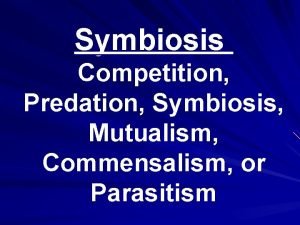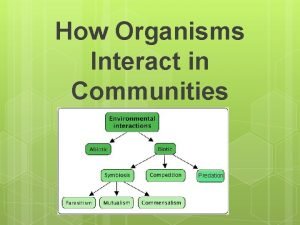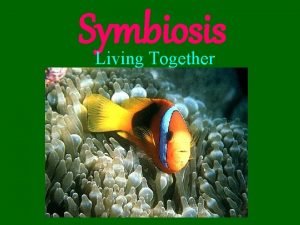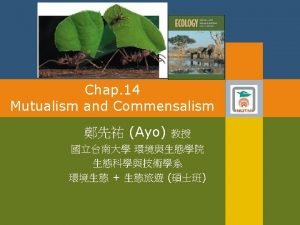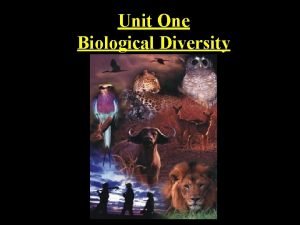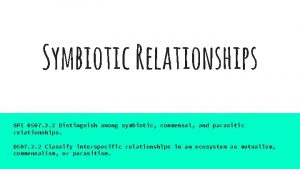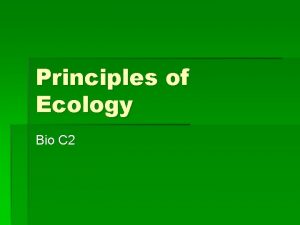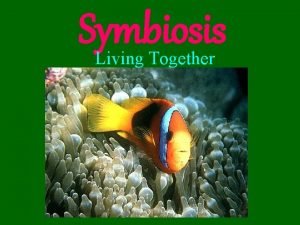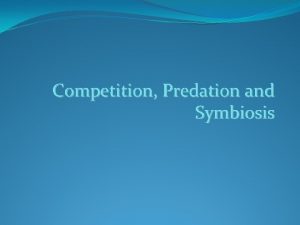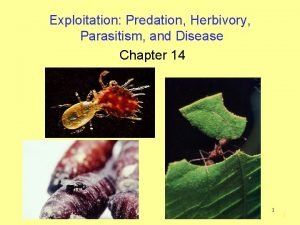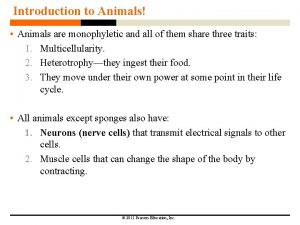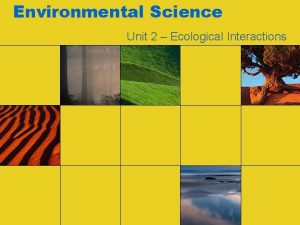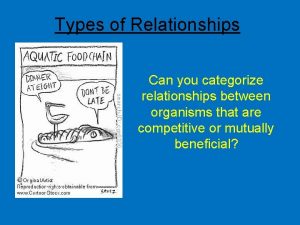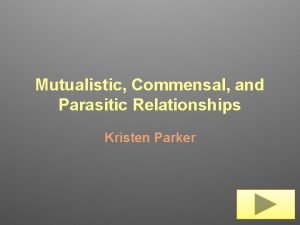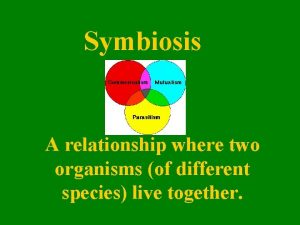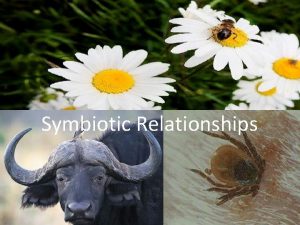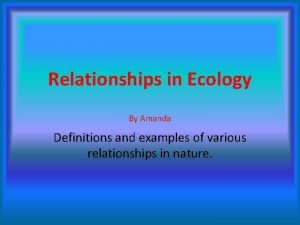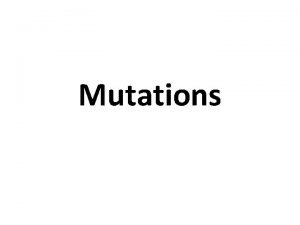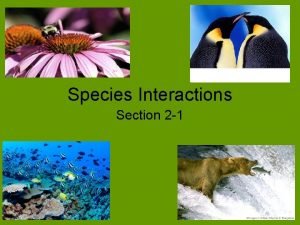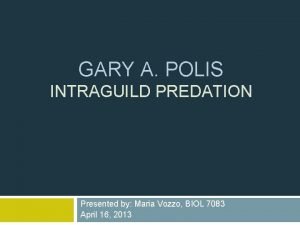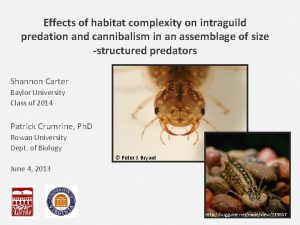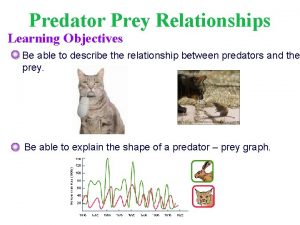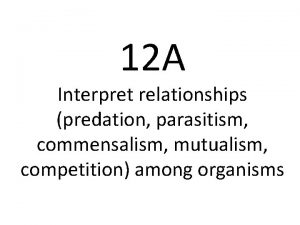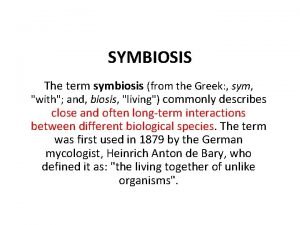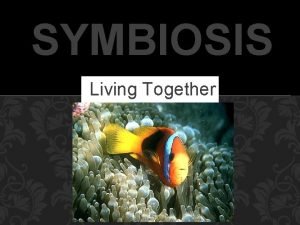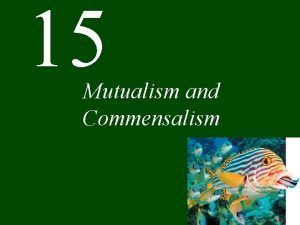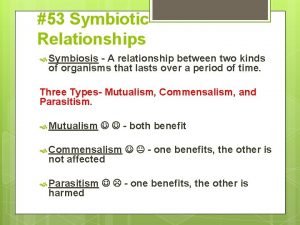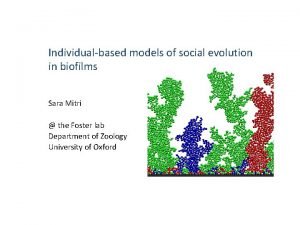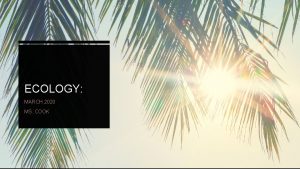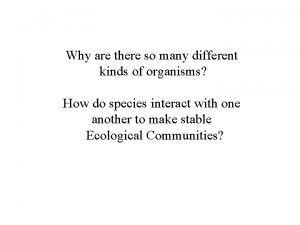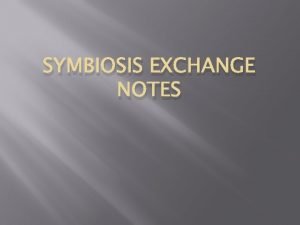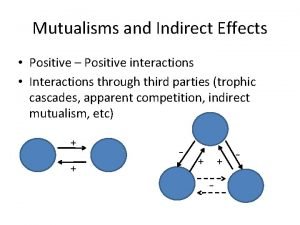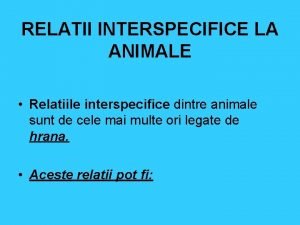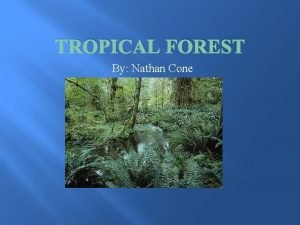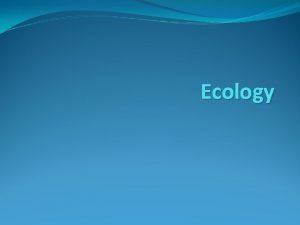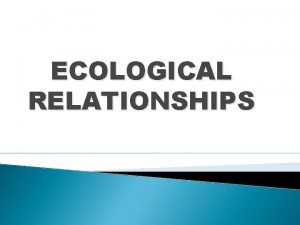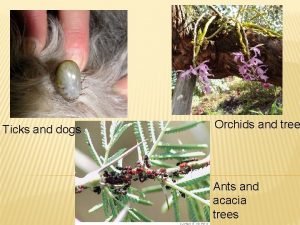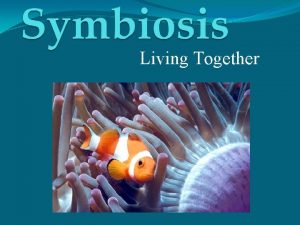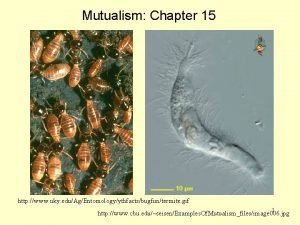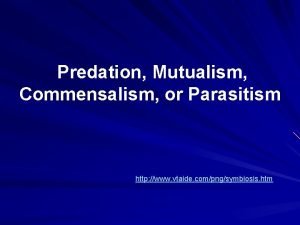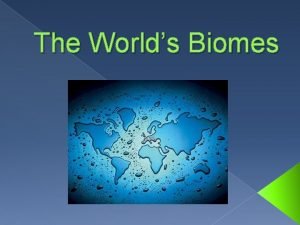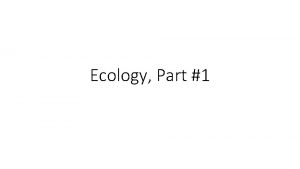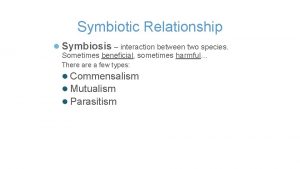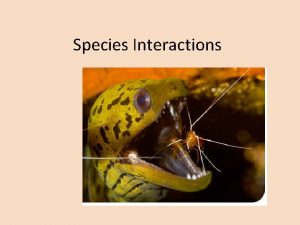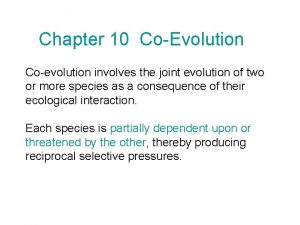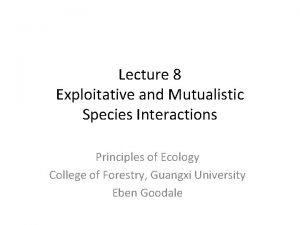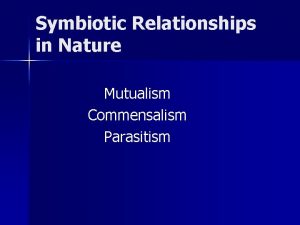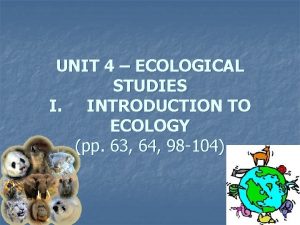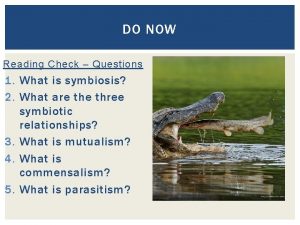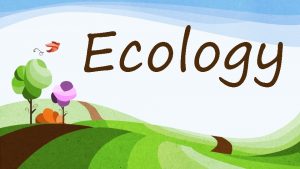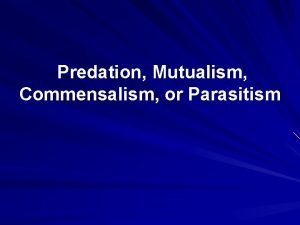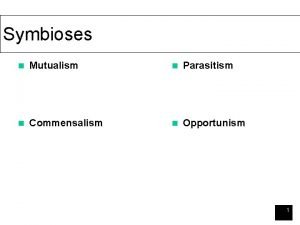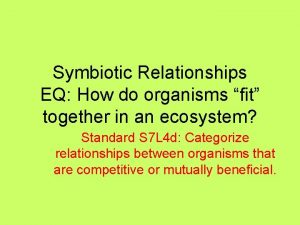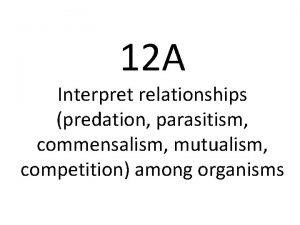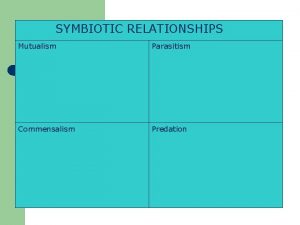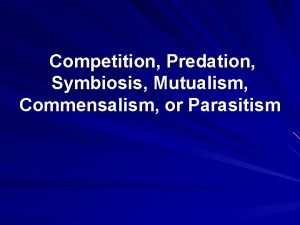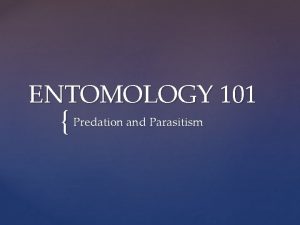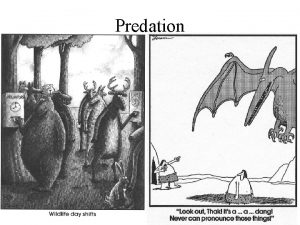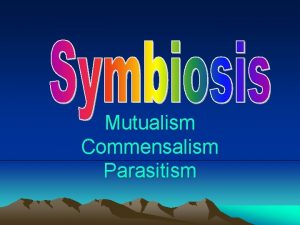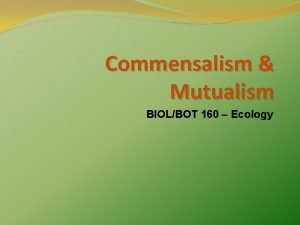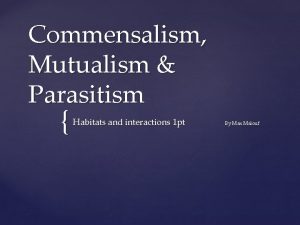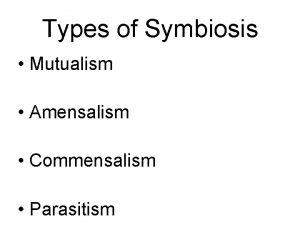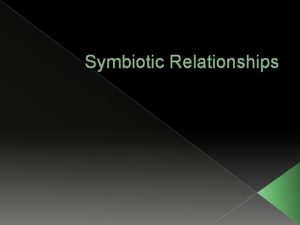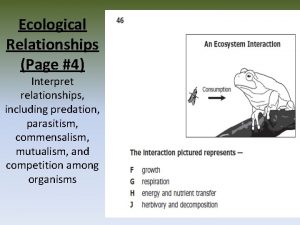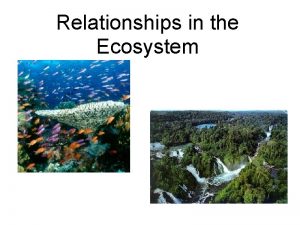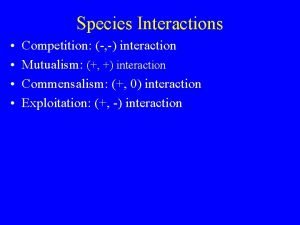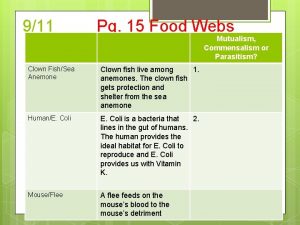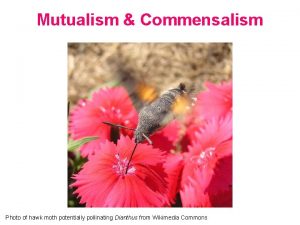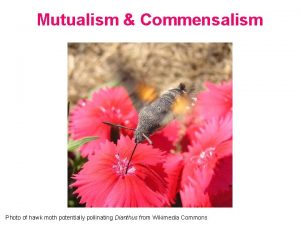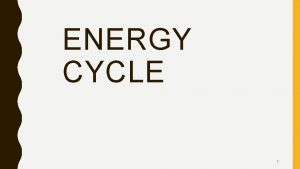12 A Interpret relationships predation parasitism commensalism mutualism





















































- Slides: 53

12 A Interpret relationships (predation, parasitism, commensalism, mutualism, competition) among organisms

An organisms role in its environment… • An organisms habitat is the area where it lives. • In any environment, every species fills a unique niche. • A niche includes the conditions and resources a species’ needs for survival and how it obtains these resources.


Relationships between Organisms

COMPETITION THE DEMAND BY TWO OR MORE ORGANISMS FOR LIMITED RESOURCES SUCH AS FOOD, WATER OR SHELTER

PREDATION INTERACTION IN WHICH ONE ORGANISM CAPTURES AND FEEDS ON ANOTHER ORGANISM

PREDATOR • LION • THE ORGANISM CAPTURING AND FEEDING ON ANOTHER ORGANISM (THE PREY)

PREY • HIPPO • ORGANISM BEING EATEN

PARASITISM SYMBIOTIC RELATIONSHIP IN WHICH ONE ORGANISM LIVES IN OR ON ANOTHER ORGANISM & CAUSES IT HARM

PARASITE • TICK • ORGANISM LIVING IN OR ON ANOTHER ORGANISM CAUSING IT HARM

HOST • DOG • ORGANISM BEING HARMED BY PARASITE

COMMENSALISM SYMBIOTIC RELATIONSHIP IN WHICH ONE ORGANISM BENEFITS & ANOTHER ORGANISM IS NEITHER HARMED NOR BENEFITS

Whale & Barnacle

Egrets & Cattle

MUTUALISM SYMBIOTIC RELATIONSHIP IN WHICH BOTH ORGANISMS BENEFIT

Clown Fish & Anemone

Flowers & Bees

12 C Analyze the flow of matter & E through trophic levels using various models (food webs, food chains, and ecological pyramids).

AUTOTROPH • aka PRODUCER • an organism that captures E from sunlight or chemicals & use it to produce its own food ex: most plants


HETEROTROPH • aka CONSUMER • an organism that obtains E from the food it consumes ex: humans, snakes, rhino, jaguar


PRIMARY CONSUMER

SECONDARY CONSUMER

TERTIARY CONSUMER

QUATERNARY CONSUMER

HERBIVORE • Organism that obtains E from eating plants

OMNIVORE • Organism that obtains E by eating both plants & animals

CARNIVORE • Organism that obtains E by eating animals

DETRITIVORE • aka DECOMPOSER • Organism that feeds on dead plant & animal material & other dead matter

SCAVENGER • Animals that eat dead animals Ex: Vultures, Tasmanian devils

FOOD CHAIN • the sequence of who eats whom in a biological community (an ecosystem) to obtain nutrition. • starts with the primary energy source • Ends with the top predator

FOOD CHAIN Quaternary consumer Tertiary consumer Secondary consumer Primary consumer Producer




FOOD WEB • Let’s put some food chains together…


Label the organisms in your notes. *organisms can have more than 1 label.

ECOLOGICAL PYRAMID • Represents the producers and consumers in an ecosystem in a pyramid shaped-diagram.


Where does all E come from?

As you go up trophic levels, 10% of Energy is lost. Why?


Most of the E is available at what level?




Biological Magnification the increasing concentration of toxic substances within each successive link in the food chain

As you go up trophic levels, the number contaminants increases.


Fill in the boxes with dots to represent the toxic contaminant.

Do your boxes look like this?
 Predation competition mutualism parasitism commensalism
Predation competition mutualism parasitism commensalism Parasitism
Parasitism Parasitism
Parasitism Mutualism vs commensalism
Mutualism vs commensalism Commensalism and mutualism difference
Commensalism and mutualism difference Difference between commensalism and mutualism
Difference between commensalism and mutualism Commensalism and mutualism
Commensalism and mutualism Three types of symbiotic relationship
Three types of symbiotic relationship Parasitism vs predation
Parasitism vs predation Parasitism
Parasitism Difference between predation and parasitism
Difference between predation and parasitism Compare and contrast mutualism and parasitism
Compare and contrast mutualism and parasitism Categorize each relationship as mutualism or parasitism.
Categorize each relationship as mutualism or parasitism. Parasitism and commensalism
Parasitism and commensalism 2 example of parasitism
2 example of parasitism Parasitism
Parasitism What are 5 examples of parasitism relationships
What are 5 examples of parasitism relationships Predation examples
Predation examples Neutral mutation
Neutral mutation Parasitism
Parasitism Gary polis
Gary polis Predation
Predation Predator examples animals
Predator examples animals Parasitism
Parasitism Parasitism
Parasitism Parasitism
Parasitism Mutualism characteristics
Mutualism characteristics Ticks feed on deer blood to the deer’s detriment.
Ticks feed on deer blood to the deer’s detriment. Mutualism
Mutualism Mutualism
Mutualism Mutualism
Mutualism What is multualism
What is multualism Indirect mutualism
Indirect mutualism Relatii de concurenta
Relatii de concurenta Symbiosis in the rainforest
Symbiosis in the rainforest Commensalism definition biology
Commensalism definition biology Mutualism
Mutualism Ticks and dogs relationship
Ticks and dogs relationship Parasitism
Parasitism Mutualism gif
Mutualism gif Multualism
Multualism Parasitism
Parasitism Mutualism
Mutualism Mutualism
Mutualism Mutualism
Mutualism Mutualism crocodile and bird
Mutualism crocodile and bird Mutualism
Mutualism What is a parasitism
What is a parasitism Heterotrophs
Heterotrophs What is commensalism
What is commensalism Commensalism examples
Commensalism examples Commensalism examples
Commensalism examples Microfloran
Microfloran What are 5 examples of commensalism?
What are 5 examples of commensalism?
